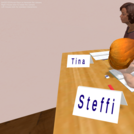Virtual Classroom
Principal investigators: Nico Klausner-Thimm
Research staff: Nico Klausner-Thimm
Project description
Learning to be a teacher entails not just “knowing that,” but also “knowing how,” a notion that is frequently echoed in the call for additional practical training opportunities in teacher education. Virtual reality (VR), as the digital technology that recreates lifelike experiences in virtual environments, has provided a solution that blends deliberate practice with authentic experience.
We at the University of Potsdam developed a fully immersive VR classroom system capable of simulating classrooms in terms of both the environment and the events that take place within them. This system was designed to provide an embodied teaching experience comparable to that of real-life classrooms. Consequently, teachers may walk freely with their own bodies, make slide show presentations, and interact with lifelike student avatars by looking (eye tracking), speaking (speech recognition), and moving (motion detection) (see Wiepke et al., 2019 for descriptions of the prototype).
This VR classroom has been integrated into a seminar aimed at student teachers’ classroom management, such as preventing and dealing with disruptive student behaviors (see Richter et al., 2019). This system has also been used as an experimental test-bed to examine teachers' behaviors and experiences under various situations (e.g., Huang et al., 2021). Meantime, we are incorporating low-inference measures such as heart rate and eye movement to access the moment-to-moment changes in teachers’ cognitive and emotional experiences.
This project is the result of close collaboration between the Educational Research in the Educational Sciences, the Department for Complex Multimedia Application Architectures in the University of Potsdam, and the Leibniz Institute for Science and Mathematics Education (IPN) in Kiel.
For additional information, please visit: researchgate
The virtual classroom in use in teacher training.
Publications
Westphal, A., Richter, E., Lazarides, R., & Huang, Y. (2024). More I-talk in student teachers’ written reflections indicates higher stress during VR teaching. Computers & Education, 104987. https://doi.org/10.1016/j.compedu.2024.104987
Bardach, L., Huang, Y., Richter, E., Klassen, R. M., Kleickmann, T., & Richter, D. (2023). Revisiting effects of teacher characteristics on physiological and psychological stress: A virtual reality study. Scientific Reports, 13(1), 22224. https://doi.org/10.1038/s41598-023-49508-0
Huang, Y., Richter, E., Kleickmann, T., Scheiter, K., & Richter, D. (2023). Body in motion, attention in focus: A virtual reality study on teachers' movement patterns and noticing. Computers & Education, 104912. https://doi.org/10.1016/j.compedu.2023.104912
Huang, Y., Richter, E., Kleickmann, T., & Richter, D. (2023). Comparing video and virtual reality as tools for fostering interest and self-efficacy in classroom management: Results of a pre-registered experiment. British Journal of Educational Technology, 54(2), 467–488. https://doi.org/10.1111/bjet.13254
Richter, E., Hußner, I., Huang, Y., Richter, D. & Lazarides, R. (2022). Video-based reflection in teacher education: Comparing virtual reality and real classroom videos. Computers & Education, 24(3), 104601. https://doi.org/10.1016/j.compedu.2022.104601
Huang, Y., Richter, E., Kleickmann, T., & Richter, D. (2022). Class size affects preservice teachers’ physiological and psychological stress reactions: An experiment in a virtual reality classroom. Computers & Education, 184, 104503. https://doi.org/10.1016/j.compedu.2022.104503
Huang, Y., Richter, E., Kleickmann, T., & Richter, D. (2022). Comparing video and virtual reality as tools for fostering interest and self-efficacy in classroom management: Results of a pre-registered experiment. British Journal of Educational Technology. https://doi.org/10.1111/bjet.13254
Huang, Y., Richter, E., Kleickmann, T., & Richter, D. (2021). Virtual reality in teacher education from 2010 to 2020: A review of program implementation, intended outcomes, and effectiveness measures [Accepted for publication]. In K. Scheiter & I. Gogolin (Eds.), Bildung für eine digitale Zukunft [Education for a Digital Future]. Springer. https://edarxiv.org/ye6uw/
Huang, Y., Richter, E., Kleickmann, T., Wiepke, A., & Richter, D. (2021). Classroom complexity affects student teachers’ behavior in a VR classroom. Computers & Education, 163, 104100. https://doi.org/10.1016/j.compedu.2020.104100
Richter, D., Wiepke, A., Richter, E., Huang, Y., & Zender, R. (2019, February). Nutzung von Virtual Reality-Technologie zur Erfassung von Klassenführungskompetenzen in der Lehrerausbildung [Using virtual reality technology to assess classroom management skills in teacher education] [Paper presentation]. Gesellschaft für Empirische Bildungsforschung [Society for Empirical Educational Research] (GEBF) 2019 Annual Meeting, Köln, NW, Germany.
Wiepke, A., Richter, E., Zender, R., & Richter, D. (2019). Einsatz von Virtual Reality zum Aufbau von Klassenmanagement-Kompetenzen im Lehramtsstudium [Using virtual reality to build classroom management skills in undergraduate teacher education]. In N. Pinkwart & J. Konert (Eds.), DELFI 2019—Die 17. Fachtagung Bildungstechnologien [Educational technologies symposium] (pp. 133–144). Gesellschaft für Informatik e.V. https://doi.org/10.18420/delfi2019_319




